四川省江油市明镜中学九年级英语《Unit8 I will help clean up the city parks》课件1 人教新目标版
- 格式:ppt
- 大小:1.35 MB
- 文档页数:57
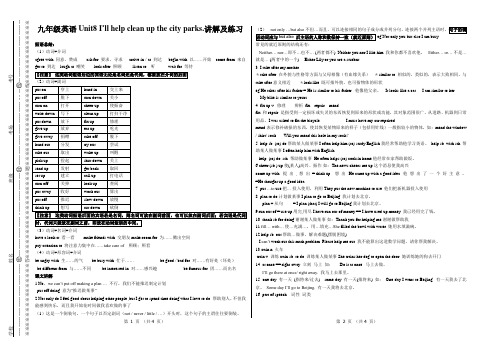
第 1 页 (共4 页) 第 2 页 (共4 页)学校 姓名 班级 考场 考号---------------------------------○密------------------ -------------------○封----------------------------- -- --○线----------------------------※※※※※※※※※※※※※※※答※※※※※※※※※※※※※※※※※※题※※※※※※※※※※※※※※※※线※※※※※※※※※※※※※九年级英语Unit8 I ’ll help clean up the city parks.讲解及练习短语总结: (1)动词+介词agree with 同意,赞成 ask for 要求,寻求 arrive in / at 到达 begin with 以……开始 come from 来自 get to 到达 laugh at 嘲笑 look after 照顾 listen to 听 wait for 等待(2)动词+副词(3)动词+名词+介词have a look at 看一看 make friends with 交朋友make room for 为……腾出空间 pay attention to 将注意力集中在……take care of 照顾;照看 (4)动词+形容词+介词be angry with 生……的气 be busy with 忙于…… be good / bad for 对……有好处(坏处) be different from 与……不同 be interested in 对……感兴趣 be famous for 因……而出名 课文讲解1.No ,we can‟t put off making a plan … 不行,我们不能推迟制定计划 put off doing 意为“推迟做某事”2.Not only do I feel good about helping other people ,but I get to spend time doing what I love to do .帮助别人,不但我能感到快乐,而且我开始花时间做我喜欢做的事了(1)这是一个倒装句。

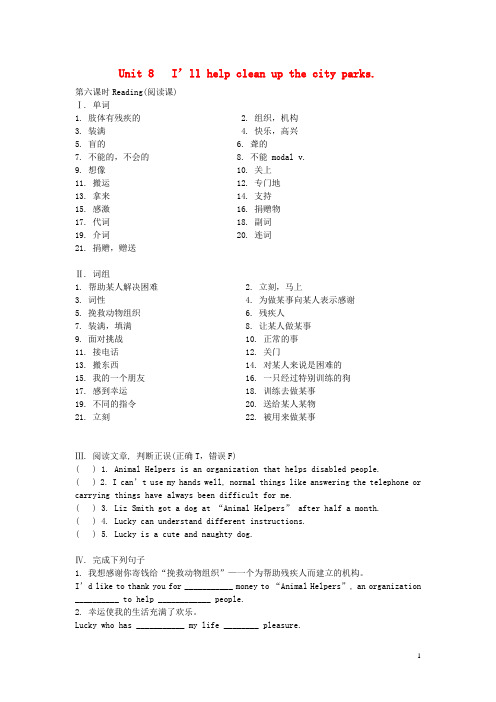
Unit 8 I’ll help clean up the city parks.第六课时Reading(阅读课)Ⅰ. 单词1. 肢体有残疾的2. 组织,机构3. 装满4. 快乐,高兴5. 盲的6. 聋的7. 不能的,不会的 8. 不能 modal v.9. 想像 10. 关上11. 搬运 12. 专门地13. 拿来 14. 支持15. 感激 16. 捐赠物17. 代词 18. 副词19. 介词 20. 连词21. 捐赠,赠送Ⅱ. 词组1. 帮助某人解决困难2. 立刻,马上3. 词性4. 为做某事向某人表示感谢5. 挽救动物组织6. 残疾人7. 装满,填满 8. 让某人做某事9. 面对挑战 10. 正常的事11. 接电话 12. 关门13. 搬东西 14. 对某人来说是困难的15. 我的一个朋友 16. 一只经过特别训练的狗17. 感到幸运 18. 训练去做某事19. 不同的指令 20. 送给某人某物21. 立刻 22. 被用来做某事Ⅲ. 阅读文章, 判断正误(正确T,错误F)( ) 1. Animal Helpers is an organization that helps disabled people.( ) 2. I can’t use my hands well, normal things like answering the telephone or carrying things have always been difficult for me.( ) 3. Liz Smith got a dog at “Animal Helpers” after half a month.( ) 4. Lucky can understand different instructions.( ) 5. Lucky is a cute and naughty dog.Ⅳ. 完成下列句子1. 我想感谢你寄钱给“挽救动物组织”—一个为帮助残疾人而建立的机构。
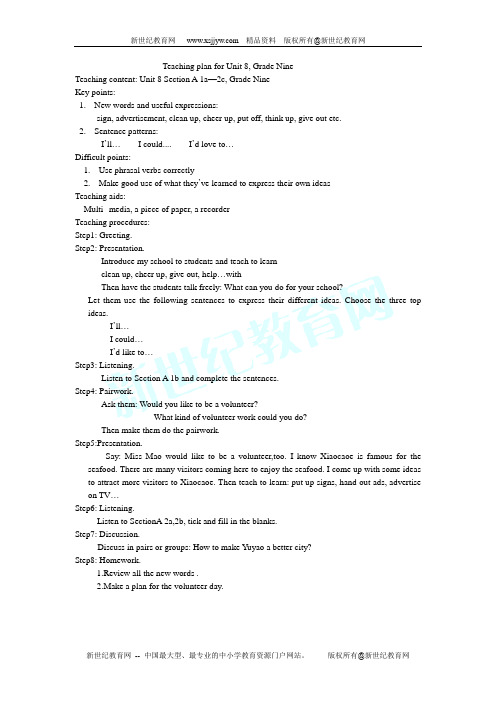
新世纪教育网 精品资料版权所有@新世纪教育网Teaching plan for Unit 8, Grade NineTeaching content: Unit 8 Section A 1a—2c, Grade NineKey points:1.New words and useful expressions:sign, advertisement, clean up, cheer up, put off, think up, give out etc.2.Sentence patterns:I’ll…I could.... I’d love to…Difficult points:e phrasal verbs correctly2.Make good use of what they’ve learned to express their own ideasTeaching aids:Multi--media, a piece of paper, a recorderTeaching procedures:Step1: Greeting.Step2: Presentation.Introduce my school to students and teach to learnclean up, cheer up, give out, help…withThen have the students talk freely: What can you do for your school?Let them use the following sentences to express their different ideas. Choose the three top ideas.I’ll…I could…I’d like to…Step3: Listening.Listen to Section A 1b and complete the sentences.Step4: Pairwork.Ask them: Would you like to be a volunteer?What kind of volunteer work could you do?Then make them do the pairwork.Step5:Presentation.Say: Miss Mao would like to be a volunteer,too. I know Xiaocaoe is famous for the seafood. There are many visitors coming here to enjoy the seafood. I come up with some ideas to attract more visitors to Xiaocaoe. Then teach to learn: put up signs, hand out ads, advertise on TV…Step6: Listening.Listen to SectionA 2a,2b, tick and fill in the blanks.Step7: Discussion.Discuss in pairs or groups: How to make Yuyao a better city?Step8: Homework.1.Review all the new words .2.Make a plan for the volunteer day.新世纪教育网-- 中国最大型、最专业的中小学教育资源门户网站。
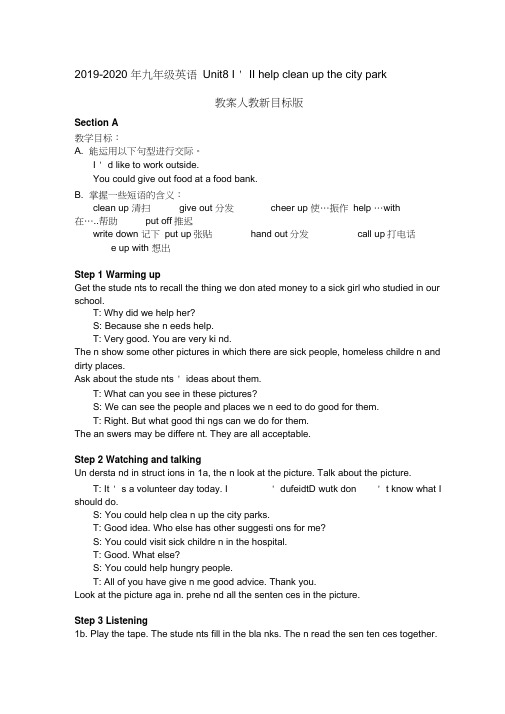
2019-2020 年九年级英语Unit8 I ' II help clean up the city park教案人教新目标版Section A教学目标:A. 能运用以下句型进行交际。
I ' d like to work outside.You could give out food at a food bank.B. 掌握一些短语的含义:clean up 清扫give out 分发cheer up 使…振作help …with在…..帮助put off推迟write down 记下put up张贴hand out分发call up打电话e up with 想出Step 1 Warming upGet the stude nts to recall the thing we don ated money to a sick girl who studied in our school.T: Why did we help her?S: Because she n eeds help.T: Very good. You are very ki nd.The n show some other pictures in which there are sick people, homeless childre n and dirty places.Ask about the stude nts ' ideas about them.T: What can you see in these pictures?S: We can see the people and places we n eed to do good for them.T: Right. But what good thi ngs can we do for them.The an swers may be differe nt. They are all acceptable.Step 2 Watching and talkingUn dersta nd in struct ions in 1a, the n look at the picture. Talk about the picture.T: It ' s a volunteer day today. I ' dufeidtD wutk don ' t know what I should do.S: You could help clea n up the city parks.T: Good idea. Who else has other suggesti ons for me?S: You could visit sick childre n in the hospital.T: Good. What else?S: You could help hungry people.T: All of you have give n me good advice. Thank you.Look at the picture aga in. prehe nd all the senten ces in the picture.Step 3 Listening1b. Play the tape. The stude nts fill in the bla nks. The n read the sen ten ces together.Ask in dividual stude nts to prehe nd the senten ces and point out every phrase they see.2a. Make sure the students understand the instructions and then listen to the tape. Try to describe the pictures they have checked with one senten ce.2b. Liste n aga in. Fill in the bla nks. Point out every phrase in the senten ce.Step 4 PairworkRole play the con versati on in 2b accord ing to one in 2c.Step 5 Grammar FocusRecall the phrases we studey in this less on. En courage the stude nts to expla in them in En glish. Then prehe nd and read the senten ces in Grammar Focus.Homework: Memorize all the phrases in this less on.第二课时教学目标:A. 能比较流利地讲述自己能够做的事情。
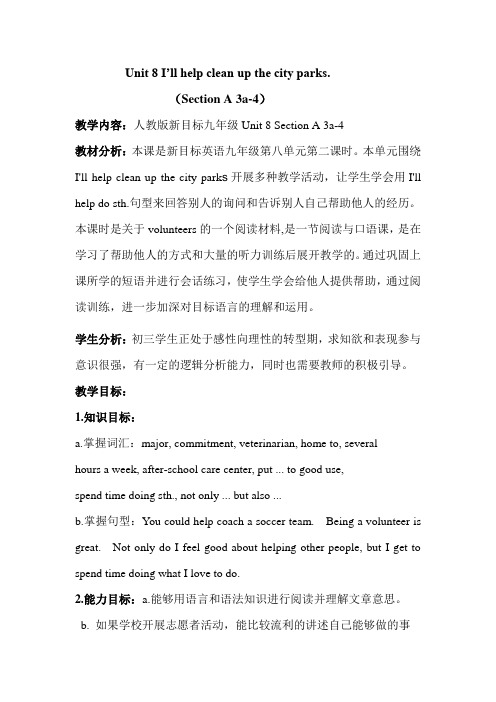
Unit 8 I’ll help clean up the city parks.(Section A 3a-4)教学内容:人教版新目标九年级Unit 8 Section A 3a-4教材分析:本课是新目标英语九年级第八单元第二课时。
本单元围绕I'll help clean up the city park s开展多种教学活动,让学生学会用I'll help do sth.句型来回答别人的询问和告诉别人自己帮助他人的经历。
本课时是关于volunteers的一个阅读材料,是一节阅读与口语课,是在学习了帮助他人的方式和大量的听力训练后展开教学的。
通过巩固上课所学的短语并进行会话练习,使学生学会给他人提供帮助,通过阅读训练,进一步加深对目标语言的理解和运用。
学生分析:初三学生正处于感性向理性的转型期,求知欲和表现参与意识很强,有一定的逻辑分析能力,同时也需要教师的积极引导。
教学目标:1.知识目标:a.掌握词汇:major, commitment, veterinarian, home to, severalhours a week, after-school care center, put ... to good use,spend time doing sth., not only ... but also ...b.掌握句型:You could help coach a soccer team. Being a volunteer is great. Not only do I feel good about helping other people, but I get to spend time doing what I love to do.2.能力目标:a.能够用语言和语法知识进行阅读并理解文章意思。
b. 如果学校开展志愿者活动,能比较流利的讲述自己能够做的事情。
C.提高学生听、说、读、写的综合能力。
Unit8 I’ll help clean up the city
parks.
适用年级九年级所属学科英语
情境:
同学们,听说过志愿者这个词吗?如果让你做一个志愿者,你会做些什么呢?然后通过一系列的助人
为乐的图片,学生进入情境,教师引出课题。
任务:语言目标:1.掌握一定量的动词短语的用法。
2.学会提供帮助的句型。
能力目标:通过学习培养学生综合运用语言知识的能力。
情感目标:通过本单元的学习,增强实际交际能力,培养学生为他人着想,热爱公益事业,乐于助人的优良品质。
成果
一,课前预习.二,师生互动引出课题
1,新授SectionA 学习本单元的主体词汇,并引出单元的中心话题和新的目标语言。
2,SectionB (1)1a-2c通过学习Jimmy的故事进行更多的听,说训练。
(2)3a-4训练学生阅读理解做笔记的能力。
3,Self Check 在这部分将训练学生的写作能力。
4,Reading 在这部分将学习一些有用的短语表达,学习写信的方法。
总之本节课的教学设计充分体现“以学生的发展为本”的教育理念,激发学生的学习兴趣,能充分调动学生学习的主观能动性,有效的解决了教材重点和难点两大问题,达到了预期的教学目的,同时教师给学生提供充分的活动空间和思维空间,在教学活动中,培养学生自主、合作、互动的能力。
资源:1,充分利用多媒体等教学设备发挥网络资源优势创设与本话题有关的情景。
如一些需要人们帮助的人或
事的图片。
2,媒体准备:一台录音机和一些幻灯片。
评估:。
九年级英语Unit8 I’ll help clean up the city parks.Part 1: Teaching design (第一部分:教学设计)Structures: Phrasal verbsTarget language: I’d like to work outside. I’ll help clean up the city parks. You could give out food at a food bank.Vocabulary: put off, hand out, call up give away, run out of, clean up, set up, take after, fix up, cheer up, give out, hunger, sign, repairLearning strategies: Taking notes, PersonalizingSECTION AGoals●To learn to use phrasal verbs●To read about being a volunteer●To listen and talk about clean up the city parksProceduresWarming up by learning about grammar focusHello, class. This week we shall go and help clean up the city parks. But first what is the meaning of “clean up”? What verb is it?Turn to page 61 and look at th e chart to learn about “phrasal verb”What is a phrasal verb?▲It is an English verb followed by one or more particles where the bination behaves as a syntactic and semantic unit; “turn out” is a phrasal verb in the question “how many turned out to vote?”▲In the English language, a phrasal verb is a verb bined with a preposition, an adverb, or anadverbial particle, all three of which are uninflected.1a Looking and readingLook at the bulletin board on page 60 and read about ways by which you could help people. Then list other ways you could help people.Work outside, clean up the city parks, help stop hunger, visit sick children call people back, find out about the flood, take part in planting trees, help provide money for the poor students, be volunteers at the 2008 Olympics1b Listening and pletingYou are going to listen to several conversations. TapescriptConversation 1Boy1:I’d like to work outside.Girl1: You could help clean up the city parks. Conversation 2Boy2: I’d like to help homeless people.Girl1: You could give out food at the food bank. Conversation 3Girl2: I’d like to cheer up sick kids.Girl1: You could visit them in the hospital. Conversation 4Girl1: I’d like to help kids with their schoolwork.Girl2: You could volunteer in an after-school study program.While listening, pay attention to information to plete the sentences on page 60 in the box.1. I’d like to work outside. You could help clean up the city parks.2. I’d like to help homeless people. You could give out food at the food bank.3. I’d like to cheer up sick kids. You could visit them in the hospital.4. I’d like to help kids with their schoolwork. You could volunteer in an after-school study program.1c Doing pairworkIn pairs you are to practice the conversations in the picture on page 60. Then make similar conversations using the information in activity 1b.▲I’d like to work outside.▲You could helpclean up the city parks.▲I could visit sickchildren in the hospital.We could help stop hunger by giving out food at the food bank. ●I’d like to work cleaning up the schoolplayground.●I’d like to help homeless people in myhometown.●I’d like to cheer up sick kids.●I could visit them in the hospital.●I’d like to help kids with their English.●We could volunteer in an after-school cleaning up program.2a Listening and checkingSome students talking about planning a City Parks Clean-up Day. Listen to their talk and check√the things they are going to do.TapescriptBoy1; OK. Now we need to e up with a plan to tell people about the city park clean-up.Girl1:Yeah, but I’m hungry, Bob. Let’s have lunch first.Girl2: No, we can’t put off making a plan. Clean-up Day is only two weeks from now.Boy2:You’re right, Sally. While we talk, I’ll write down all our ideas. Then we can decide which ideas are best.Girl1:Um… well… we could put up signs.√Boy2:That’s a good idea!Girl2: I’ll hand out advertisements after school.√Boy1; OK. Great! And we could each call up ten people and ask them to e.√Boy2: Hey, we’re ing up with a lot of good ideas, aren’t we?2b Listening and filling in blanksI’ shall play the tape again and you are to listen and fill in the blanks in the box on 61.1.We need to e up with a plan.2.We can’t put off making a plan. Clean-up Day is only two weeks from now.3. I’ll write down all our ideas.4. We could put up signs.5. I’ll hand out advertisements after school.6. We could each call up ten people and ask them to e.2c Doing pairworkLet’s go on to role play the conversation in activity 2b.A:We need to e up with a plan.B:Let’s have lunch first.A: No, w e can’t put off making a plan. Clean-up Day is only two weeks from now.B:I’ll write down all our ideas that we e out with.A: We could put up signs after school.B:We’ll hand out advertisements at weekends.A: At home we could each call up ten people and ask them to e.B: We could get online to make our plan known to all.3a Reading, underlining and circlingOn page 62 is an article about volunteers. Read it and underline the kinds of work they do. You have to circle the reasons why they like their work.Being a volunteer is great!Number 77 High School is home to three very special young people: Li Huiping, LanPei, and Zhu Ming. These three students all volunteer their time to help other people. This volunteer work takes each of them several hours a week, so it is a major mitment. Huiping loves to read, and she puts this love to good use by working in the after-school care center at her local elementary school. Here, she helps young children to read. Pei loves animals, and plans to study to be a veterinarian when he leaves school. He spends every Saturday morning working in an animal hospital. Ming wants to be a professional singer. He sings for groups of people at the city hospital to cheer them up.“V olunteering is great!” says Huiping. “Not only do I feel good about helping other people, but I get to spend time doing what I love to do.” Pei says he has learned more about animals. Ming says he has met some wonderful people at the hospital. The three students plan to set up a studentvolunteer project at their school. “Don’t put it off,” says Huiping. “Bee a volunteer today!”Read the article again to darken the phrasal verbs found in it.3b Filling in the tableOn page 62 is a table showing the kinds of volunteer work the four students could do. Read the table and fill in it.Name Loves CouldHui Football Teach the pupils to playfootballXiao Tang Writing stories Turn the city people’s life intostoriesJoy Movies Show free movies to thevillagersWei Music Play music to cheer people up3c Doing pairNext take turns role playing being one of the people in 3b by asking and giving advice.A:I’d like to join the school volunteer project, but I’m not sure what I should do.B: What do you like doing?A: I love playing football.B: Well, you could help coach a football team for little kids.A:I’d like to join the class volunteer project, but I’m not sure what I shoulddo.B: What do you like doing?A: I love writing stories.B: Well, you could help write stories forcitizens.A:I’d like to join the town volunteer project, but I’m not sure what I should do.B: What do you like doing?A: I love seeing movies.B: Well, you could help introduce good movies to the farmers.A:I’d like to join the city volunteer project, but I’m not sure what I should do.B: What do you like doing?A: I love playing music.B: Well, you could help organize a music band for the factory workers.4 Doing pairworkIn the table on bottom of page 62 write down three things you like to do and then askyour partner for advice about the kinds of volunteer work you could do.Things I like to do Volunteer work I could do1. reading in English Help teach English to those poor in English2. surfing online Help getting useful information online for thefarmers3. collecting ancient coins Help give a speech on ancient Chinese culture A: I like to reading in English. What kind of volunteer work do you think I could do?B: You could help teach English to those poor in English.A: I like to surfing online. What kind of volunteer work do you think I could do?B: You could help get useful information online for the farmers teach English to those poor inEnglish.A: I like to collect ancient coins. What kind of volunteer work do you think I could do? B: You could help give a speech on ancient Chinese culture.Closing down by reading an English poemFalling Asleep in ClassI fell asleep in class today,as I was awfully bored.I laid my head upon my deskand closed my eyes and snored.I woke to find a piece of papersticking to my face.I'd slobbered on my textbooksand my hair was a disgrace.My clothes were badly rumpledand my eyes were glazed and red.My binder left a three-ringindentation in my head.I slept through class, and probablyI would have slept some more,except my students woke meas they headed out the door.Kenn NesbittSECTION BGoals●To Learn more phrasal verbs●To listen, speak and write using phrasal verbsProceduresWarming up by brainstorming phrasal verbsHello, everyone. To begin with, we shall brainstorm a list of phrasal verbs.talk to…, begin with, laugh at…, wait for…, look after…, look up, fall asleep, get back, get off, get on, get on with…, get up, go back, go on, go shopping, go to school, grow up, hear from…, hold on, listen to…, take …away, take out…, take… down, turn off…, turn on…, wake up, write down…1 Reading and matchingOn page 63 is a box with 4 sentences. Match them with their similar meanings on the right.__b__1. I’ve run out of it.__c__2. I take after my mother. __a__3. I fix it up.__d__4. I gave it away. A. I repair it.B. I don’t have any more of it.C. I am similar to her.D. I didn’t sell it.1b Making sentencesOn page 63 you will find a box with some phrasal verbs. Make a sentence with each of the phrasalverbs.run out of, take after, fix up, give away 1.Two dogs ran after the fox.2.She takes after her sister.3.I had my puter fixed up.4.She gave her watch way to me. 2a Listening and numberingListen to the recording that I am going to play and number the pictures on page 63. (Key:a4,b2,c1,d3 )TapescriptMan:This morning I’m talking with a very generous young man, Jimmy the BikeBoy. Jimmy is the boy whofixes up old bikes and gives them away. Good morning, Jimmy.Boy: Good morning.Man: So, Jimmy, tell our listeners what you do.Boy: Well, like you said, I find or buy old bikes that nobody wants. Then I fix up the bikes and give them away to kidswho don’t have enough money to buy their ownbikes.Man: That’s fantastic. What gave you the idea?Boy: I guessI take after my father. He’s always helping people.Man: Wow! Your parents must be proud of you.Boy: I guess so. But now I’ve run out of money to buy old bikes.Man: Oh, that’s too bad.Boy: Yeah. I need to e up with some way of getting moneyor I’ll have to stop.2b Listening and circlingYou shall listen to the recording again to circle “T” or “F”.1.Jimmy fixes up bicycles. T F2.Jimmy sells bikes. T F3.Jimmy takes after his mother. T F4.Jimmy has run out of money. T F2c Doing pairworkIn pairs practice the conversations between Jmmy and the reporter. Use the information from the activities on page 63.A: What do you do Jimmy?B: I fix up bikes and give them away.A:What kind person are you?B:People say I’m a very generous young man.A: Where do you get the old bikes?B:Well, I find or buy old bikes that nobody wants.A: Whom do you give your repaired bike to?B: I give it to kids who don’t have enough money to buy their own bikes.A:What gave you the idea?B:I take after my father. He’s always helping people.A: Are your parents proud of you?B:I guess so.3a Reading and underliningOn page 64 is an article about Jimmy the Bike Boy. Read to understand it and underline all the phrasal verbs.Copy all the phrasal verbs and useful expressions onto your notebook.3b Making a noteRead the article again to make a note of the things that Jimmy did in order to sole his problem.1.He did a radio interview.2.He also put up some signs asking for old bikes.3.He called up all his friends and told them about the problem.4.He even handed out advertisements at a local supermarket.5.He told the teachers at school about his problem and they set up a call-in center for parents.4 Doing groupworkBy brainstorming work out a plan for helping out in your munity. Write down where and what you will volunteer and tell your classmates about your plan.teach at a night school, help at a hospital, work at an old peop le’s home, speak English at an English corner, write letters for people who can’t read and write, get information online for the farmers who can’t use Internet, repair bikes, radios, puters and other things for citizens…Closing down by talking about volunteer workLook at the pictures below and talk about the volunteer work that the people in the pictures aredoing.SELF CHECK1.Filling and makingTurn to page 65 and fill in the blank with a correct word given in its correct form. Then make a sentence with each of the given words.Give way, take after, e up with, give out, hang out1.Be quiet please, class. I’m going to give out your test papers.2.My friend Dave es up with a great deal of ideas. We’re goingto make a pen pal web site.3.I give away some clothes to charity because they were too smallfor me.4.On weekends I like to hang out at the sports club with my friends.5.Jim takes after his father. They are both clever and a bit quiet.1.Never give out your personal information to strangers.2.He came up with a bright idea.3.He gave away some old book to the poor students in the countryside.4.She used to hang out a lot after school.5.You don’t take after your father. He is more talkative than you are.2 Writing an article tell about SallyOn page 65 is a box with words and phrases. Write an article telling about what happens to Sally. Sally Brown/ a young woman/ wants to be a professional singer/ as a volunteer/ sing at a local hospital/ cheer up sick people/ also sing at school/ run out of money for singing lessons/ e up with ideas for making money/ put up signs asking for singing jobs/ also call up parents offering singing lessons for children/ now will be able to continue her lessons/ bee a professional singerSally Brown is a young woman who wants to be a professional singer. She often works as a volunteer sing at a local hospital to cheer up sick people. She also sings at school. But now she has run out of money for singing lessons. Yesterday she came up with ideas for making money. She put up signs asking for singing jobs. She also called up parents offering singing lessons for children. Now she has money and will be able to continue her lessons. She will certainly bee a professional singer.Just for funLook at the pictures and make a storyout of them.Reading: I’ll send you a photo ofLucky.Before you read, listen to the recording without looking at the article.While you read,underline all the phrasal verbs, blacken all the expressions and circle all the linking words.After you read, copy down all the phrasal verbs and useful expressions into your notebook.Dear Miss Li,I’d like to thank you forsending money to “Animal Helpers”, an organization set up to help disabled people. For sure, you have helped make it possible for me to have “Lucky”, who has filled my life with pleasure. Let me tell you my story.Being blind, deaf, unable to walk, or use your hands easily is soothing that most people cannot imagine. But there are many people whoface these challenges, and I am one of them. Because I cannot use my arms or legs well. Normal things like answering the telephone, opening and shutting doors, or carrying things have always been difficult for me. Then one day last year, a friend of mine said that she would like to help me out. She saidshe would talk to “Animal Helpers” to see if it would be possible for me to get a specially trained dog. She also thoughta dog might cheer me up. I told herI love animals, andthat I’d love to have a dog.After six months of training with a dog at “Animal Helpers”, I was able to bring him home. My dog’s name is “Lucky”— a good name for him because I feel very lucky to have him. You see,Part 2: Teaching Resources (第二部分:教学资源)I. What is a volunteer?A volunteer is someone who performs or offers to perform a service out of his own free will, oftenwithout payment. The year 2001 was the International Year of the V olunteer. 2005 is the UK Year of the V olunteer.People may volunteer to perform some work, e.g., of charitable character. Some volunteer for clinical trials or other medical research, and may even donate their bodies to science after their death.II. What is an online Volunteer?An online volunteer is a person who contributes time and effort with an organization through an online connection, rather than in person. A wide variety of people from around the world are online volunteers and most are not technology professionals.Online volunteers may provide advice, consultancy and perform remote administration tasks for the organisation, usually a charity or non-profit organisation. The practice of donating time online goes by other names, such as virtual volunteering, cyber service, telementoring, e-volunteering, and cyber volunteering.There are many opportunities for people to donate their services using the internet. Online volunteers do a variety of tasks, such as translating documents, editing or preparing proposals, designing logos, researching information, developing strategic plans, reviewing budgets, creating web pages, designing flash presentations, moderating online discussion groups and managing other online volunteers.III. What is an ICT Volunteer?An ICT volunteer is someone who is working to foster the implementation and use of Information and munication Technologies. He or she can install hardware, software or carry on with ICT training programmes. There is no need to be an online volunteer to be an ICT volunteer: installing hardware is a good example. Likewise, there is no need to be an ICT volunteer to be an online volunteer: teaching a language through a virtual campus is not related with ICT fostering, at least in a direct way.....。